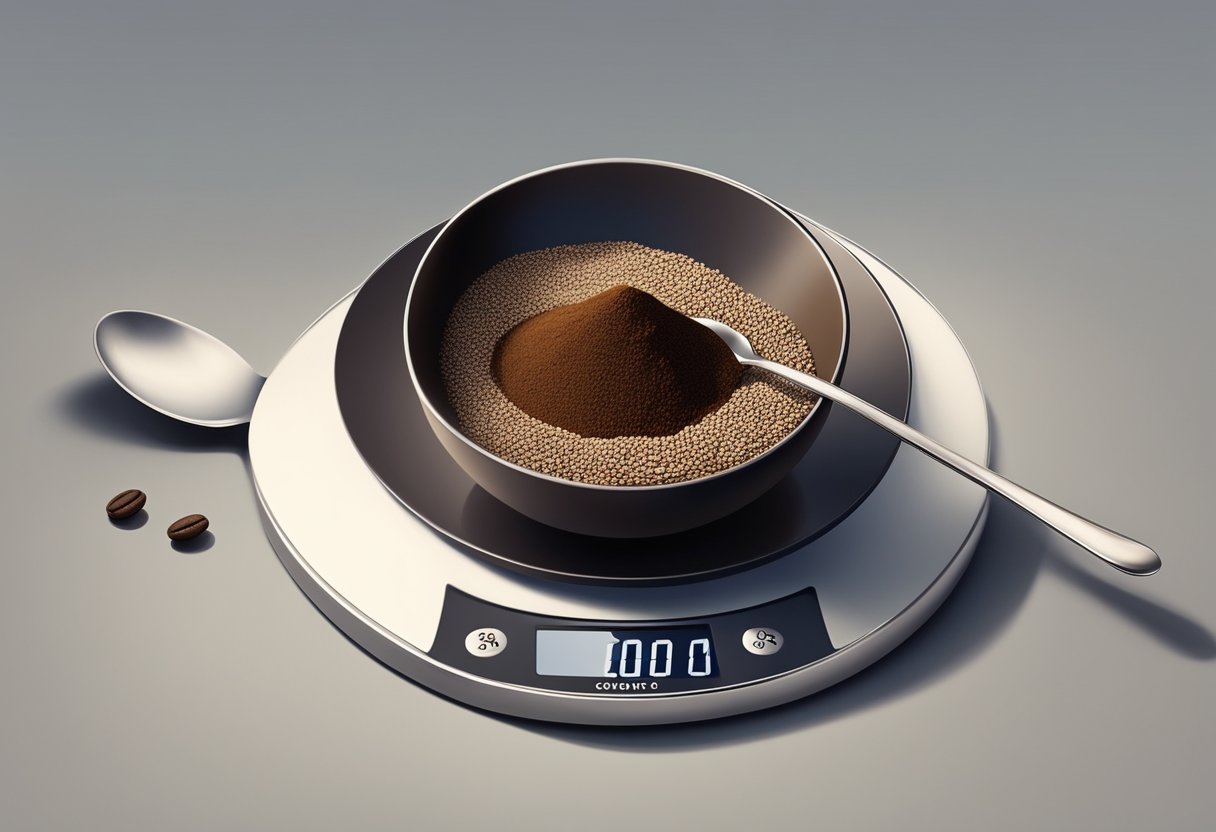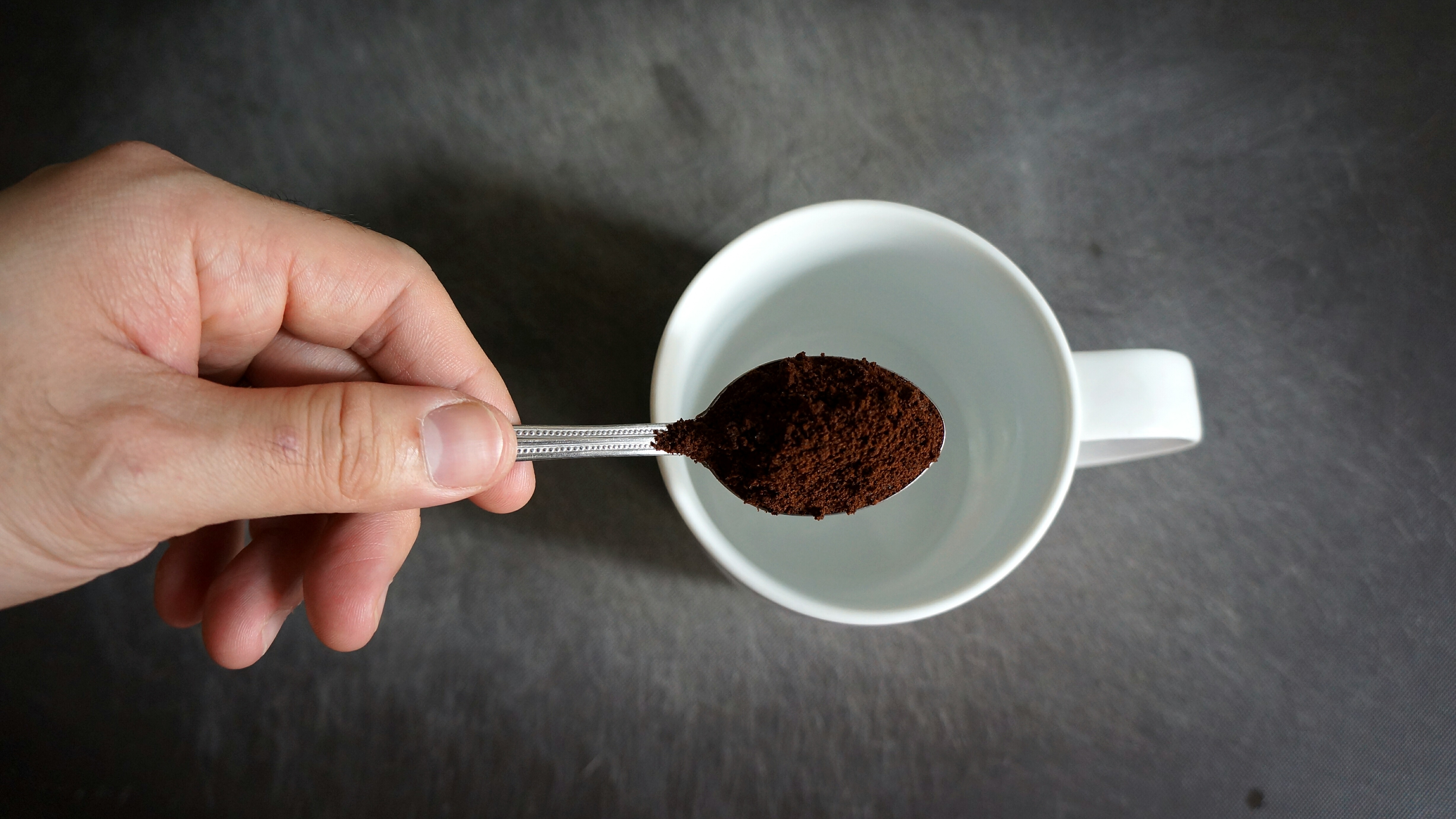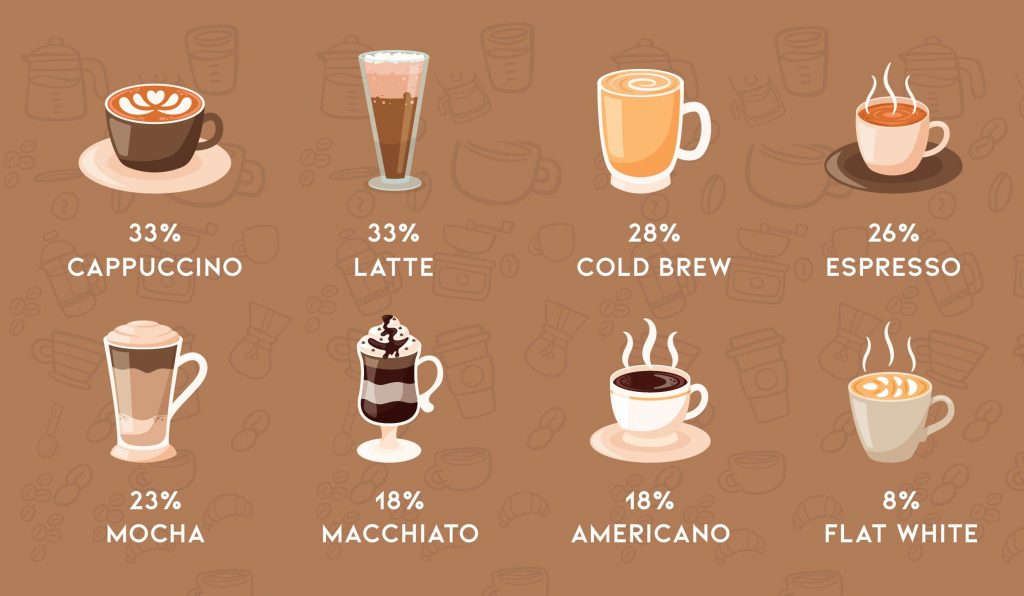A tablespoon of coffee contains about 60 to 80 milligrams of caffeine. This amount can vary based on the type of coffee bean and brewing method.
Coffee is a beloved beverage for many, providing a much-needed energy boost. Understanding the caffeine content in your morning brew can help you manage your intake. Caffeine is a natural stimulant that can enhance focus and alertness. Knowing how much caffeine is in a tablespoon of coffee helps you enjoy your drink while staying mindful of your consumption.
This guide will explore the factors influencing caffeine levels and provide insights to help you make informed choices. Whether you’re a coffee enthusiast or someone looking to monitor caffeine, this information is essential.

Credit: therestaurantauthority.com
Caffeine Content In Coffee
Understanding the caffeine content in a tablespoon of coffee can be tricky. Different factors affect the amount of caffeine in your coffee. Knowing these factors helps you control your caffeine intake. Let’s explore these factors and the importance of accurate measurement.
Factors Influencing Caffeine Levels
Several elements influence the caffeine levels in your coffee. The type of coffee bean matters. Arabica beans have less caffeine than Robusta beans. The roasting process also plays a role. Darker roasts have slightly less caffeine than lighter roasts. The grind size affects caffeine extraction. Finer grinds release more caffeine than coarse grinds. Water temperature and brewing time are crucial. Hotter water and longer brewing times extract more caffeine. Each of these factors changes the caffeine content in your coffee.
Importance Of Measurement
Accurate measurement is essential for consistent caffeine levels. Using a tablespoon is a common practice. But, variations in coffee grounds can lead to inconsistent caffeine content. Measuring by weight provides more accuracy. A kitchen scale ensures consistent caffeine levels in your coffee. Understanding the importance of measurement helps you manage your caffeine intake. It also ensures you enjoy your coffee just the way you like it.

Credit: www.livestrong.com
Measuring Caffeine In A Tablespoon
Understanding how much caffeine is in your coffee can help you manage your intake. A tablespoon is a common measure, but the caffeine content can vary. Let’s break it down.
Standard Measurements
A standard tablespoon of coffee grounds usually contains about 5 grams of coffee. The caffeine content in this amount ranges between 60 to 80 milligrams. This range is due to differences in coffee beans and brewing methods.
Variations By Coffee Type
Different types of coffee have different caffeine levels. Here’s a quick look:
| Coffee Type | Caffeine per Tablespoon |
|---|---|
| Arabica | 60 mg |
| Robusta | 110 mg |
| Espresso | 50 mg |
Arabica beans are the most common and contain less caffeine than Robusta. Espresso has a higher concentration, but less is used per serving.
Knowing these differences helps you choose the right coffee for your caffeine needs. Always measure your coffee to ensure consistent caffeine intake.
Surprising Facts About Caffeine
Caffeine is a part of daily life for many people. It wakes us up and keeps us alert. But how much do we know about this stimulant? There are many surprising facts about caffeine that might change the way you look at your morning coffee.
Myths And Truths
Many myths surround caffeine. Some people believe it is harmful. Others think it is harmless. The truth lies somewhere in between. Moderate caffeine intake is generally safe for most people. But, too much can lead to negative effects. These include insomnia, jitteriness, and an increased heart rate.
Another common myth is that dark roast coffee has more caffeine than light roast. In reality, light roast coffee has slightly more caffeine. The roasting process reduces caffeine content. So, the lighter the roast, the higher the caffeine.
Unexpected Sources Of Caffeine
Coffee is not the only source of caffeine. There are many unexpected sources too. Some of these might surprise you.
- Tea: Both black and green teas contain caffeine. A cup of black tea has about 47 mg of caffeine. Green tea has around 28 mg.
- Chocolate: Dark chocolate contains more caffeine than milk chocolate. One ounce of dark chocolate has about 12 mg of caffeine.
- Soft Drinks: Many soft drinks have caffeine. A can of cola has about 22 mg of caffeine.
- Energy Drinks: These drinks are high in caffeine. One can of energy drink can have as much as 80 mg or more.
- Over-the-Counter Medications: Some pain relievers and cold medicines contain caffeine. Always check the labels.
Understanding these surprising facts about caffeine can help you manage your intake. Whether you are a coffee lover or not, knowing where caffeine hides can keep you informed and healthy.
Health Implications Of Caffeine
Caffeine, a natural stimulant found in coffee, has various health implications. Understanding these effects is essential for making informed choices about coffee consumption.
Short-term Effects
Drinking coffee can boost your energy levels. This is due to caffeine’s stimulating effects on the brain. It helps you stay alert and focused. Caffeine can also improve your mood and enhance cognitive functions.
On the downside, too much caffeine can lead to jitters. You may also experience increased heart rate or anxiety. It’s essential to monitor your intake to avoid these negative effects.
Long-term Health Benefits
Regular coffee consumption has several long-term health benefits. Studies suggest it may reduce the risk of certain diseases. Coffee drinkers may have a lower chance of developing Parkinson’s disease and Alzheimer’s disease.
Some research indicates that coffee can protect the liver. It may lower the risk of liver diseases such as cirrhosis. Additionally, caffeine can help improve metabolic rate. This leads to better weight management.
Moderate coffee consumption might also lower the risk of certain cancers. These include liver and colorectal cancer. Coffee’s antioxidants play a key role in these protective effects.
Comparing Different Coffee Varieties
Coffee lovers often wonder about the caffeine content in their favorite brews. The amount of caffeine can vary greatly depending on the type of coffee beans used. In this section, we will compare the caffeine content of different coffee varieties. Understanding these differences can help you choose the perfect cup for your needs.
Arabica Vs. Robusta
Arabica and Robusta are the two most common coffee species. They differ significantly in their caffeine content.
| Coffee Variety | Caffeine Content (mg per tablespoon) |
|---|---|
| Arabica | 30-50 |
| Robusta | 50-80 |
Arabica beans are known for their smooth and mild flavor. They have less caffeine compared to Robusta beans. On the other hand, Robusta beans have a stronger, more bitter taste. They contain almost twice the caffeine of Arabica beans.
Specialty Coffees
Specialty coffees can also vary in their caffeine content. These include espresso, cold brew, and decaf.
- Espresso: About 60-70 mg per tablespoon. It is highly concentrated.
- Cold Brew: Approximately 40-60 mg per tablespoon. It is steeped for a long time.
- Decaf: Around 2-5 mg per tablespoon. Almost all caffeine is removed.
The method of brewing also affects the caffeine levels. Espresso is strong and has a quick extraction process. Cold brew extracts caffeine slowly over hours, resulting in a smoother taste. Decaf goes through a process to remove most of the caffeine.
Choosing the right type of coffee can depend on your caffeine needs and taste preferences. Whether you prefer a mild Arabica or a strong Robusta, understanding these differences can enhance your coffee experience.
Brewing Methods And Caffeine Content
Caffeine content in coffee varies with brewing methods. Different methods extract caffeine differently. Understanding these differences helps you manage your caffeine intake. Let’s explore how brewing methods affect caffeine content.
Drip Coffee
Drip coffee is common in many homes. It involves hot water dripping over ground coffee. The water passes through a filter, collecting in a pot. Drip coffee usually has moderate caffeine levels. On average, one tablespoon of coffee grounds has about 60-70 mg of caffeine.
Factors like grind size and water temperature matter. A finer grind and hotter water can increase caffeine extraction. But, if you use a coarser grind, less caffeine will be extracted. Adjusting these factors can help you control your caffeine consumption.
Espresso
Espresso is a concentrated form of coffee. Hot water is forced through finely-ground coffee at high pressure. This process extracts a lot of caffeine in a short time. One tablespoon of espresso grounds has around 30-50 mg of caffeine.
Despite its strong flavor, an espresso shot is small, about one ounce. So, a single shot has less caffeine than a full cup of drip coffee. But, because of its strength, many people think it has more caffeine.
Cold Brew
Cold brew coffee is made by steeping coffee grounds in cold water for 12-24 hours. This method extracts caffeine slowly and results in a smooth taste. One tablespoon of cold brew coffee grounds can contain about 80-100 mg of caffeine.
The long steeping time increases caffeine content. Cold brew concentrate is often diluted with water or milk. So, the final caffeine content in your cup may vary. Cold brew is a good option if you prefer a less acidic and stronger caffeine punch.
Daily Caffeine Consumption
Understanding daily caffeine consumption helps maintain a balanced lifestyle. Caffeine can boost energy and focus. But too much can lead to health problems. Knowing the amount in a tablespoon of coffee is the first step.
Recommended Limits
Experts suggest not exceeding 400 mg of caffeine daily. This equals about four cups of brewed coffee. Pregnant women should limit to 200 mg per day. Adolescents and children should consume even less.
Personal Tolerance Levels
Caffeine affects people differently. Some feel jittery after one cup. Others can drink several cups without issue. Listen to your body. Adjust your intake based on how you feel.
Credit: www.quora.com
Tips For Managing Caffeine Intake
Managing caffeine intake is crucial for maintaining a healthy lifestyle. Too much caffeine can lead to jitteriness, insomnia, and other health issues. Here are some tips to help you manage your caffeine consumption effectively.
Alternatives To Coffee
Looking for ways to cut down on coffee? There are several healthy alternatives:
- Herbal Teas: Chamomile or peppermint tea can be soothing.
- Decaf Coffee: Enjoy the taste without the high caffeine content.
- Green Tea: Contains less caffeine and offers antioxidants.
- Golden Milk: A mix of turmeric, milk, and honey.
- Hot Water with Lemon: Refreshing and caffeine-free.
Reducing Caffeine Dependence
Reducing your reliance on caffeine takes time and effort. Here are some strategies:
- Gradual Reduction: Slowly decrease your daily caffeine intake.
- Hydrate: Drink more water to reduce cravings for caffeinated drinks.
- Sleep Well: Adequate sleep reduces the need for caffeine.
- Exercise: Physical activity can boost your energy naturally.
- Mindful Consumption: Pay attention to how much caffeine you consume.
Making small changes can have a big impact on your caffeine intake. By incorporating these tips, you can enjoy a healthier lifestyle with less dependence on caffeine.
Frequently Asked Questions
How Much Caffeine In A Tablespoon Of Coffee?
A tablespoon of ground coffee contains approximately 60 milligrams of caffeine. This can vary based on the coffee bean type and grind size.
Does Coffee Type Affect Caffeine Content?
Yes, the type of coffee bean and roast level can affect caffeine content. Arabica beans generally have less caffeine than Robusta beans.
Is A Tablespoon Of Coffee Enough For Brewing?
One tablespoon of ground coffee is typically enough for a small cup. For stronger coffee, use more grounds.
How To Measure Coffee For Accurate Caffeine?
Use a digital kitchen scale to measure coffee grounds accurately. This ensures consistent caffeine content in each cup.
Conclusion
Knowing the caffeine content helps manage your coffee intake better. A tablespoon of coffee generally contains 60-90 milligrams of caffeine. This varies based on the type of coffee and brewing method. Always check specific brands for exact amounts. Moderation is key to enjoying coffee’s benefits without side effects.
Stay informed and enjoy your coffee responsibly.
